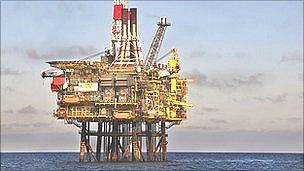Shell fights spill near North Sea oil platform
- Published

Oil giant Royal Dutch Shell has said it is working to stop a leak at one of its North Sea oil platforms.
The leak was found near the Gannet Alpha platform, 180 km (113 miles) from Aberdeen, Scotland.
Shell would not say how much oil had been released so far, merely describing it as "not a significant spill" and saying it had largely stemmed the leak.
One of the wells at the Gannet oilfield has been closed, but the company would not say if production was reduced.
The company said it had sent a clean-up vessel to the location and has a plane monitoring the surface.
It confirmed the leak was continuing, having been found in a flow line connecting an oil well to the platform.
'Finite amount'
The UK Department of Energy and Climate Change said it was in contact with Shell and investigating the incident in the usual way.
The department's spokesman added that it understood from Shell that there was a "finite amount of oil that can be dispersed" but stressed that regulators were taking the leak seriously.
The Health and Safety executive confirmed it was monitoring the situation.
A Scottish government spokesman also said it was monitoring the situation and would update ministers, adding that Marine Scotland, which manages Scotland's waters, was in close contact with key organisations including Shell.
A Shell spokesman said it was "managing" the leak.
"We deployed a remote-operated vehicle to check for a sub-sea leak after a light sheen was noticed in the area.
"We have stemmed the leak significantly and we are taking further measures to isolate it.
"The sub-sea well has been shut in, and the flow line is being de-pressurised," he added.
The Gannet oil field reportedly produced about 13,500 barrels of oil per day between January and April of this year.
Friends of the Earth Scotland said the spill showed the dangers of offshore drilling in the North Sea.
"Any spill, however small, should serve as a warning sign and encourage us to look to a clean, renewable energy future, rather than continuing to invest in dirty oil," said Juliet Swann, head of campaigns at the environmental group.
The field is co-owned by Esso, a subsidiary of US oil firm Exxon but operated by Shell.
- Published3 August 2011
- Published28 July 2011